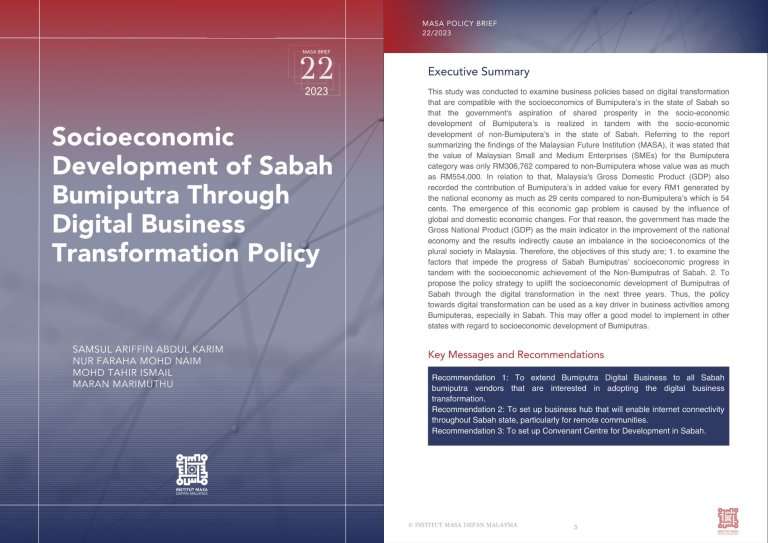This study was conducted to examine business policies based on digital transformation that are compatible with the socioeconomics of Bumiputera’s in the state of Sabah so that the government’s aspiration of shared prosperity in the socio-economic development of Bumiputera’s is realized in tandem with the socio-economic development of non-Bumiputera’s in the state of Sabah. Referring to the report summarizing the findings of the Malaysian Future Institution (MASA), it was stated that the value of Malaysian Small and Medium Enterprises (SMEs) for the Bumiputera category was only RM306,762 compared to non-Bumiputera whose value was as much as RM554,000. In relation to that, Malaysia’s Gross Domestic Product (GDP) also recorded the contribution of Bumiputera’s in added value for every RM1 generated by the national economy as much as 29 cents compared to non-Bumiputera’s which is 54 cents. The emergence of this economic gap problem is caused by the influence of global and domestic economic changes. For that reason, the government has made the Gross National Product (GDP) as the main indicator in the improvement of the national economy and the results indirectly cause an imbalance in the socioeconomics of the plural society in Malaysia. Therefore, the objectives of this study are; 1. to examine the factors that impede the progress of Sabah Bumiputras’ socioeconomic progress in tandem with the socioeconomic achievement of the Non-Bumiputras of Sabah. 2. To propose the policy strategy to uplift the socioeconomic development of Bumiputras of Sabah through the digital transformation in the next three years. Thus, the policy towards digital transformation can be used as a key driver in business activities among Bumiputeras, especially in Sabah. This may offer a good model to implement in other states with regard to socioeconomic development of Bumiputras.
#22: Socioeconomic Development of Sabah Bumiputra Through Digital Business Transformation Policy
- Laporan Dasar, Program Pembangunan Dasar MASA
Kongsi Artikel
Artikel Lain
Artikel
Oleh Muhammad Iman Khidir Tarmidzi Siswazah muda dalam dekad kebelakangan ini, terperangkap dalam...
Siaran Media
KENYATAAN MEDIA TINJAUAN KAJI SELIDIK PENDAPAT UMUM MENGENAI PRESTASI PENTADBIRAN, SOSIO-EKONOMI DAN POLITIK...
Artikel
Oleh Solahuddiin Ismail Mina Jangka hayat ketika lahir adalah satu anggaran purata umur...
Artikel
Oleh Mohamad Fauzi Ahmad Meskipun ekonomi Malaysia bergantung pada permintaan domestik, sumbangan bumiputera...
Artikel
Oleh Muhammad Iman Khidir Tarmidzi Siswazah muda dalam dekad kebelakangan ini, terperangkap dalam...
Siaran Media
KENYATAAN MEDIA TINJAUAN KAJI SELIDIK PENDAPAT UMUM MENGENAI PRESTASI PENTADBIRAN, SOSIO-EKONOMI DAN POLITIK...
Artikel
Oleh Solahuddiin Ismail Mina Jangka hayat ketika lahir adalah satu anggaran purata umur...
Artikel
Oleh Mohamad Fauzi Ahmad Meskipun ekonomi Malaysia bergantung pada permintaan domestik, sumbangan bumiputera...
Artikel
Oleh Muhammad Iman Khidir Tarmidzi Siswazah muda dalam dekad kebelakangan ini, terperangkap dalam...




